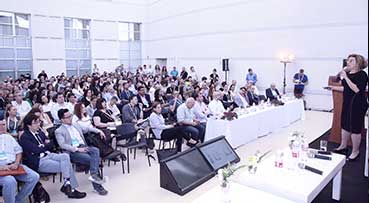In today’s rapidly evolving world of work, the benefits designed for a different era no longer hold the power to attract, retain, and motivate top talent. It’s time to rethink, reimagine, and revitalize our benefits strategies to align with the changing needs and aspirations of employees.
We should begin with the end in mind. Benefits are meant to connect employees to the organization and free up maximum time for work. The “old” benefits were designed in a world where work was a place, aiming to keep people in the workplace with their co-workers. Now, work is no longer a place but something we do at various locations, including home offices, co-working spaces, and online. Given that benefits still aim to connect, engage, and free up time to work, we should explore new ways to make that happen in a dispersed work environment.
Let’s explore how benefit categories can evolve and dive into detailed examples that can inspire and guide this transformation.
Work-Life Integration – Freeing up Time where it Matters:
In today’s ever-changing work landscape, flexibility and work-life integration have become the focal points. Employees now have the freedom to navigate between their personal and professional responsibilities throughout the day and week. It is essential to design benefits that empower them to achieve a seamless balance. While we work on creating personalized work-life integration platforms that integrate productivity trackers, well-being dashboards, and facilitate work-life harmony, here are some immediate benefits in this space:
Flexible Workspaces: In addition to remote work options, companies can provide employees with access to a diverse network of flexible workspaces, such as coworking spaces or private office facilities situated in various locations. This unique benefit caters to employees’ preferences and allows them to keep their commute time within 15 minutes while providing an environment that enhances their productivity and fosters collaboration.
Sabbatical Programs: Enabling employees to take extended breaks, ranging from a few weeks to a few months, sabbatical programs provide them with the opportunity to pursue personal projects, travel, or engage in self-reflection and personal growth. These programs allow employees to recharge, explore new interests, and return to work with renewed energy, fresh perspectives, and a greater sense of purpose. Airbnb offers its employees a $2,000 annual travel stipend and Patagonia provides employees up to two months of paid leave to work for environmental causes they are passionate about.
Personal Concierge Services: Offering employees access to personal concierge services, such as assistance with errands, travel arrangements, and household tasks, can greatly alleviate their non-work-related responsibilities. This benefit provides convenience and support, allowing individuals to prioritize their core responsibilities and personal well-being. Examples of services may include outsourcing shopping, meal preparation, and other household chores, effectively reducing stress and enhancing work-life balance. Adobe “Work-Life Concierge” offers a range of services to support employees during important life events.
Holistic Well-being – Helping get through life challenges:
As healthcare undergoes a transformation, traditional healthcare benefits will also see significant changes. We are witnessing the rise of telemedicine, wearable devices, and health monitoring apps, as well as the expansion of healthcare to encompass preventive and personalized care, along with broader well-being. However, well-being extends beyond healthcare alone; it encompasses our ability to cope with life’s challenges. Consider benefits that help employees address the challenges they face in life and work, whether it’s caring for parents or young children, managing medical issues, or overcoming other difficulties. While we work towards providing personalized preventive care, healthcare, and wellness options, here are some immediate benefits in this space:
Expanded Healthcare Programs: Enriching healthcare offerings to encompass broader well-being is crucial, incorporating holistic approaches to physical and mental health. This can involve providing counseling services for nutrition, stress management, and lifestyle choices. Zappos “Life Coaching Services” provide personalized coaching sessions with certified life coaches who assist employees in navigating life challenges, setting goals, and finding fulfillment both personally and professionally.
Health and Wellness Subscriptions: Embracing the digital age, companies can offer health and wellness subscriptions that provide access to meditation apps, fitness platforms, or meal planning services. These tools empower employees to cultivate healthy habits and embark on their personal wellness journeys, promoting a balanced and thriving workforce.
Family Support Services: Recognizing the diverse caregiving responsibilities of employees, companies can extend their support beyond traditional parental leave policies. By offering comprehensive family support, including childcare subsidies, backup care programs, and assistance in finding trusted caregivers for elderly family members, employers can create a nurturing environment where employees feel supported in balancing their work and family obligations. Patagonia “Family Care” provides subsidized backup childcare services, allowing employees to navigate unexpected childcare challenges and maintain work-life balance during critical times.
Cultural and Hobby Allowance: To foster a well-rounded lifestyle and promote work-life balance, companies can provide employees with a cultural and hobby allowance. This allowance allows individuals to pursue activities such as attending theater performances, visiting art exhibitions, or participating in hobby classes.
Travel Allowance: A travel allowance or travel reimbursement program can be implemented to support employees in exploring new destinations and taking time off to visit family and friends. This benefit not only fosters work-life balance but also provides opportunities for personal enrichment and enhances employee satisfaction.
Growth and Learning – not just about our job:
In today’s fast-paced environment, employees recognize the importance of ongoing personal and professional growth for job security and personal fulfillment. While learning platforms, personalized development plans, and mentoring programs remain valuable, they are no longer enough. Employees crave the empowerment to take charge of their own growth and learning through various avenues. Here are some immediate benefit options in this realm:
Career Sabbaticals: Offering extended career breaks with guaranteed job security upon their return is a valuable benefit that encourages employees to explore new career paths, pursue entrepreneurial endeavors, or engage in personal projects. This initiative not only retains top talent within the organization but also provides individuals with the opportunity for self-discovery and professional growth.
Personal Development Stipend: Empowering employees to take control of their personal and professional growth journey, a personal development stipend allows them to invest in activities and resources that enhance their skills and knowledge. This could include attending conferences, enrolling in courses, purchasing books, acquiring memberships or subscriptions, pursuing certifications, or even hiring a career coach.
Time for Passion Projects: Allocating dedicated time during work hours for employees to pursue their personal passion projects or side ventures is not only a source of fuel for creativity and innovation but also a clear demonstration of support for their individual interests and aspirations beyond their primary role. Atlassian’s “ShipIt Days” give employees the opportunity to work on their own innovative projects for 24 hours.
Professional Growth Experiences: Providing employees with opportunities to engage in international exchange programs or participate in cross-functional projects outside their department or even organization can have a transformative impact on their professional development. These experiences expose individuals to new perspectives, enhance their professional network, and foster continuous growth.
Financial Wellness and Independence:
The financial well-being of employees has a profound impact on their engagement and productivity. Benefits should encompass flexible compensation packages customized to individual needs, empowering employees to make informed financial decisions, plan for their future, and achieve their financial goals. This includes considerations for career transitions and retirement. Some examples of such benefits are:
Professional Services Allowance: Offering employees a professional services allowance provides them with the freedom to access personalized services such as financial planning, career coaching, or legal advice. This benefit demonstrates the organization’s commitment to supporting employees in addressing their specific needs and empowers them to make informed decisions in various aspects of their lives.
Financial Wellness Education: Providing financial wellness workshops or resources that cover topics such as budgeting, investing, and debt management equips employees with valuable financial knowledge and empowers them to make informed decisions for their financial future. This benefit supports employees in developing the necessary skills and understanding to manage their finances effectively and achieve their long-term financial goals.
Financial Assistance Fund: As a flexible element of the benefits budget, the financial assistance fund allows employees to personalize their benefits according to their specific needs. This fund provides employees with the opportunity to allocate resources where they are most needed, whether it’s for unexpected expenses, medical bills, home repairs, or emergency situations. Boxed “Boxed Cares” program, provides employees access to financial assistance for unexpected expenses, helping them maintain financial stability during challenging times.
Inclusion and Diversity – Embracing the Power of Differences:
Benefits play a crucial role in an organization’s commitment to inclusivity, ensuring that every individual feels valued, included, and empowered to contribute their best. It is important to offer benefits that acknowledge and support diverse family structures, various paths to parenthood, and the diverse caregiving responsibilities employees may have, as well as other life choices. Here are some examples:
Fertility Assistance: This program recognizes the challenges that employees may encounter when starting or expanding their families. It offers financial support for fertility treatments and access to specialized resources. By providing this benefit, companies demonstrate their care and support for employees’ personal journeys towards parenthood.
Parental Support Networks: By creating dedicated support networks for working parents, such as parent-to-parent mentoring programs, resource sharing platforms, and workshops on parenting and work-life integration, companies can alleviate the challenges faced by employees with children and enhance their overall well-being. These networks provide a valuable source of guidance, collaboration, and community for working parents, fostering a supportive environment where they can thrive both personally and professionally.
Volunteer Time Off (VTO): Offering employees dedicated time off to engage in volunteer work or community service not only fosters a sense of purpose and fulfillment but also aligns with the company’s values and social responsibility. VTO allows individuals to contribute their time and skills to causes they are passionate about, making a positive impact on the community while gaining a deeper sense of connection and fulfillment in their work. Salesforce provides employees with six days of paid leave per year for personal purposes. Employees can use this time to celebrate personal milestones, engage in volunteer work, or support charitable causes they care about.
Pet-Friendly Policies: Embracing pet-friendly policies by allowing pets in the workplace or providing pet insurance and pet care services can be a unique and impactful benefit that enhances the overall well-being of employees who are pet owners. This benefit recognizes the significant role that pets play in people’s lives and acknowledges the positive impact they can have on their owners’ mental health, stress reduction, and overall happiness.
Milestone Experience Allowance: Allocating a dedicated budget that employees can use to celebrate significant life events, such as weddings, anniversaries, or graduations, is a thoughtful benefit that demonstrates appreciation for employees’ personal milestones. This allowance provides financial support during these important occasions and enables employees to create cherished memories within a predetermined budget.
The time for change has arrived. The future of employee benefits is not just about adapting to the new normal; it’s about embracing the opportunities that lie ahead. The key to designing unique benefits lies in understanding the specific needs and aspirations of your employees while aligning them with the company’s culture and values. By offering distinctive and tailored benefits, companies can differentiate themselves, increase employee satisfaction, and retain top talent. It’s about creating an ecosystem where individuals can flourish, organizations can innovate, and society can prosper. So, let’s embark on this journey, unlocking the full potential of the future of work, careers, and the way we live.

![large-AX1A2125-2[1] large-AX1A2125-2[1]](https://niritcohen.com/wp-content/uploads/elementor/thumbs/large-AX1A2125-21-pnzedcs72atx5aeurqytqdiihxixlq02re9mlz805s.jpg)






